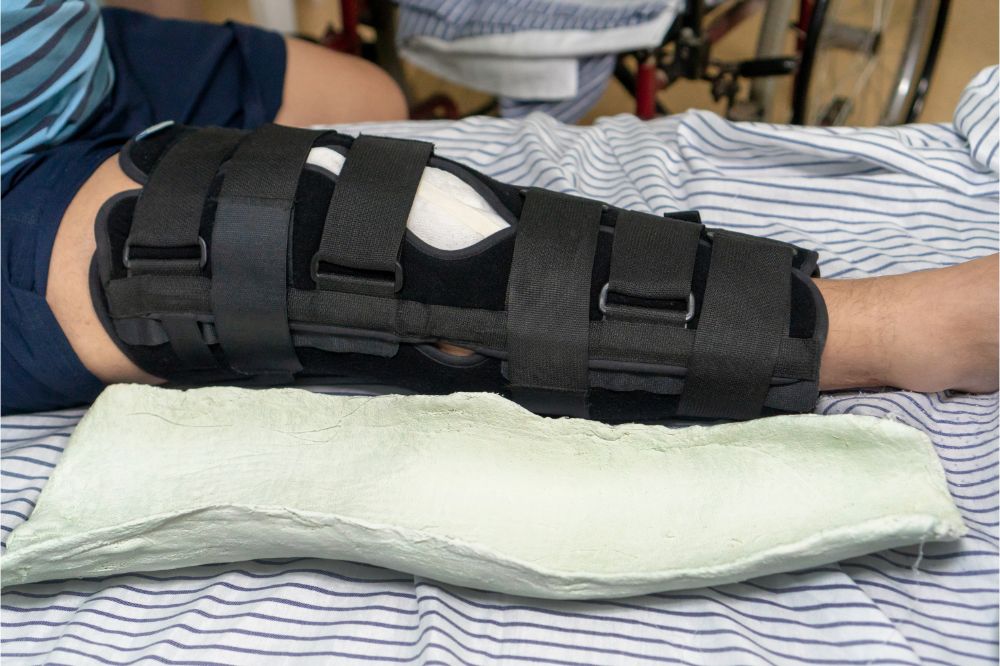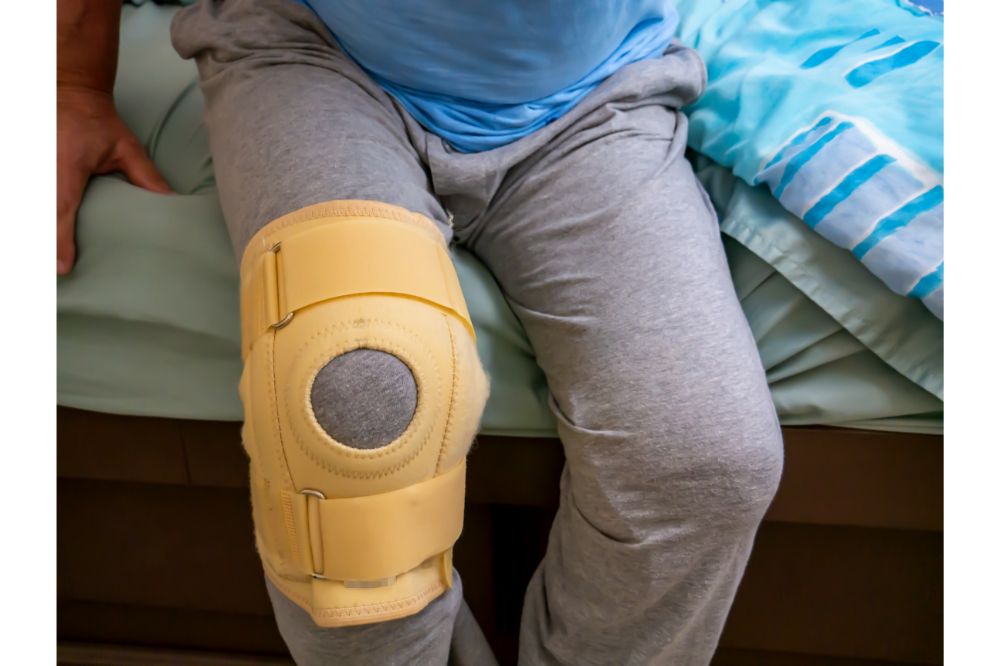A knee brace is one of the most common and effective ways to rehabilitate a bad knee.
Whether it’s from an injury or the result of overuse, your doctor will most likely recommend this to restore your knees’ function.
However, no one can dispute that knee braces can be mildly uncomfortable.
For instance, wearing it all day causes skin problems like irritation and itching. This leads people to ask whether or not they can remove it before sleeping.
Should you wear a knee brace to bed? Here’s what we found out.

Should You Wear a Knee Brace to Bed?
Whether or not you should wear knee braces while sleeping depends on the current condition of your knees.
Doctors sometimes instruct their patients to keep the knee braces on, especially with chronic knee pain or severe injuries.
This is also true for those undergoing post-operative care after knee surgery.
On the other hand, if you don’t experience pain, tingling, cramping, or numbing in your knee and legs before going to bed, taking the braces off will not make such a huge impact on your recovery.
Still, it is important to keep in mind that knee braces help speed up your healing process. So, if it’s not uncomfortable for you, keeping them on when you go to bed is encouraged.
Reminders When Wearing a Knee Brace to Bed
If you decide to wear knee braces or even just compression sleeves when you go to sleep (or are instructed to do so by your physical therapist), make sure you follow these reminders:
1. Check the Size
If it’s your first time wearing a knee brace or you’re on your way to buying one, determine the right size for you.
If it is too small for you, it might cut off the blood circulation in your knees. On the other hand, a knee brace that’s too big might fall off or not do anything to help you recover.
Most knee braces have straps you can adjust to get the right fit. Nonetheless, getting a perfect size is still necessary for its efficiency.
2. Take Pain Medication
More often than not, a doctor will prescribe the patient pain medication, especially with a knee injury.
Aside from reducing pain, this type of medication, like the BioSchwartz Turmeric Cucumin Capsules, also helps reduce inflammation.
The increased blood flow is vital in helping you fall asleep faster and healing your knee joint.
Make sure you take these before going to bed with a knee compression sleeve on.
3. Mind How You Sleep
Your sleeping position will affect the overall progress of your healing.
You want to keep your knee stable and ensure you don’t put too much weight or pressure on it while you sleep.
If you sleep on your side, it’s best to lie on the opposite side of your injured knee. It ensures that the injured knee is on the top side.
Otherwise, the weight of your other leg, combined with the knee sleeve, might make you feel too hot and uncomfortable.
4. Consider Taking Supplements
If you continuously conduct your daily activities while trying to rehabilitate your knee, you should consider taking supplements, especially if you’re suffering from ligament injuries.
Supplements help lube your joints and may even reduce pressure on the knees, allowing you to move freely without causing too much pain.
While you can monitor your movements while you’re awake, the case is not the same when you’re sleeping.
Taking supplements helps ensure that sudden movements while sleeping do not cause more damage to your knees.
5. Try a Knee Immobilizer
A soft knee brace is important if you want to sleep comfortably. However, one problem with this is that you can still bend your knee freely.
This can result in all sorts of problems and tremendous pain when you unconsciously bend it a bad way while you sleep.
That’s why a rigid knee brace is the better option in severe cases like sports injuries.
This type of brace immobilizes your knee so that your leg remains straight even while you’re asleep.
Some post-op knee braces, like the NEENCA Hinged Knee Brace, would even allow you to lock and unlock them so that you can still bend your knee when conducting certain activities.
What To Avoid When Wearing a Knee Brace To Bed
It’s true that wearing a knee brace benefits your healing process.
However, you must keep in mind that doing so at night might also cause lots of problems, especially when you’re not careful.

Here are some of the things you need to avoid to keep your knee safe when wearing knee braces or sleeves:
Neglecting Your Skin
Your elastic knee sleeve is most likely made out of absorbent material. Therefore, it doesn’t take much for dirt, body fluids, and bacteria to build up within it.
The constant friction between the material and your skin can also cause abrasions and irritation.
Thus, if you don’t want your skin to chafe and prevent you from getting a good night’s sleep, make sure you take care of your skin.
You can use a moisturizer or lotion to keep your skin smooth. Some creams also aid in healing while leaving a protective layer between your skin and the brace.
Based on our experience, the Miracle Plus Arnica Relief Cream is an excellent option for that.
Forgetting Rehabilitation Exercises
Rehabilitation exercises ensure your knees heal quickly, so you must do them daily.
Some think exercise will only worsen their injuries, but rehabilitation exercises actually increase the blood flow to the affected area and improve circulation.
That said, you also need to be mindful of the exercise intensity.
Try to limit your routine to low-impact exercises to avoid straining your injured knee. Otherwise, it may not be able to handle the intense pressure from your movements.
This can prevent you from falling asleep soundly because of immense pain.
Not Meditating
Did you know that too much stress can slow down your healing? It means that if you constantly feel stressed, you may continuously feel pain in your knee.
All of this can prevent you from falling asleep more quickly. That’s why it is also a great idea to meditate before going to sleep.
Take the time to relax and put your mind at ease. This can ultimately help you get a good night’s sleep despite the minor discomfort from the knee brace.
Not Enough Support
In some cases, positioning your knees at the wrong angle can cause pain and discomfort. Using additional pillows under your knee can help keep it in position while you sleep.
Still, you want to make sure you don’t elevate it too much. If you do, it might be harder for your blood to flow to your lower limbs.
This can prolong your healing and might even cause moderate pain. Use just enough pillows to keep you comfortable.
Wearing Knee Brace To Sleep
So, should you wear a knee brace to bed? Yes! Knee braces will shorten your recovery time.
It might even be more important when you sleep because that’s when your body becomes more efficient in healing itself.
On the other hand, if you are not suffering from an injury or undergoing rehabilitation, and the knee brace is too uncomfortable, you can take it off when you go to bed.
It’s also best to consult your doctor or a healthcare professional, as they might have specific solutions to your knee brace concerns.